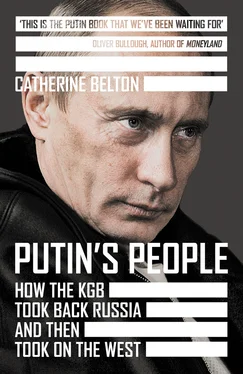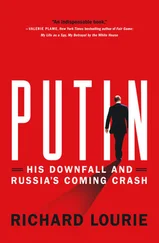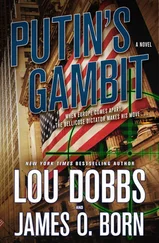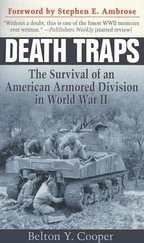The Kremlin had further honed its operations in the UK court system through its pursuit of Mukhtar Ablyazov, a Kazakh billionaire who happened to be the biggest political foe of the Kazakh president, a key Kremlin ally, Nursultan Nazarbayev. Ablyazov was pursued by Russia’s state deposit insurance agency, which charged him with siphoning more than $4 billion from the Kazakh BTA Bank, of which he had been chairman, and which had branches across Russia. The Russian agency hired a team of lawyers from the top London law firm Hogan Lovells, who launched eleven civil fraud lawsuits against Ablyazov in the UK, as well as a freezing order on his assets. Private detectives had traced the siphoned $4 billion to a network of offshore companies controlled by the Kazakh tycoon.[7]
But in Pugachev’s case, no stolen or hidden assets appeared to have been found. No fraud claims had ever been launched in the UK, or anywhere else outside Russia. Instead, on the basis of a Russian court ruling alone, the same team from Hogan Lovells had won the freezing order against Pugachev’s assets, and ably ran rings around him while he chafed at the multitude of court orders that came his way. He’d been interrogated over asset disclosures, and found to have given false evidence over whether the sale of his coal business had been conducted by himself or by his son. It didn’t seem to matter to the judge that the sale had been forced through at a price that was less than one twentieth of the business’s real value. What mattered was whether he’d followed procedure and declared all the assets that remained under his control. Pugachev had been forced to hand over his passports to the court, and was banned from leaving the UK during a prolonged period of questioning over his asset disclosures as the Kremlin’s lawyers tightened the legal net. He’d run through a series of lawyers who in turn seemed baffled by a case that had never been heard on its merits in the UK, while others viewed him mendaciously as easy prey. Spoilt by the flood of Russian cases that Moscow’s tycoons were willing to pay top prices for airing in London’s High Court, legal firms padded their bills to astronomical sums for work that was never done, as documents show. PR firms offered to defend Pugachev’s image for £100,000 a month. ‘He’s on our territory now,’ said one partner at a global law firm representing him.
At first Pugachev had believed the case against him was being driven by unruly Kremlin underlings anxious to draw a line over their expropriation of his business empire. But as the campaign expanded, and Pugachev began to fear for his physical safety, he became convinced that it was being guided by Putin himself. ‘How could he do this to me? I even made him president,’ he said that evening as he sat in his Chelsea kitchen, still shell-shocked by the visit from SO15 and the suspicious devices found underneath his cars.[8] A former friend sent by the Kremlin to London had told him that Putin was personally managing every step of the campaign against him, warning: ‘We have control of everything here, we’ve got everything all stitched up.’
Pugachev had long detected the growing influence of Kremlin cash in London. Long before the legal attack started, he said, he’d met a string of English lords who’d guffawed and shaken his hand, and told him how great they thought Putin was. In those days they believed Pugachev was ‘Putin’s banker’, as the press had called him then, yet they’d still asked him to donate to the Conservative Party without any question or thought. All his former friends from the Kremlin kept relatives and mistresses in town, who they visited at weekends, flooding the city with cash. There was Sechin’s ex-wife, Marina, who kept a house with her daughter here. There was Igor Shuvalov, the deputy prime minister, who owned the most prestigious flat in the city, a penthouse overlooking Trafalgar Square. There were the sons of Arkady Rotenberg, Putin’s billionaire former judo partner, who attended one of the country’s most vaunted private schools, while his ex-wife Natalya shopped and sued her husband for divorce in London’s High Court. There was the deputy speaker of the State Duma, one of Russia’s most vocal patriots, Sergei Zheleznyak, who’d long raged against the influence of the West, yet his daughter Anastasia had lived in London for years. The list of officials resident in London was endless, said Pugachev. ‘They have sorted themselves out very well on this small island with terrible weather,’ he sniffed. ‘In the UK, the main thing was always money. Putin sent his agents to corrupt the British elite.’
The city had grown used to the flood of Russian cash. Property prices had surged as first tycoons and then Russian officials had bought up high-end mansions in Knightsbridge, Kensington and Belgravia. A string of Russian share offerings, led by the state’s Rosneft, Sberbank and VTB, had helped pay the rents and wages for the offices of London’s well-heeled PR and legal firms. Lords and former politicians were paid lavish salaries to serve on Russian companies’ boards, although they were granted little oversight of corporate conduct. Russia’s influence was everywhere. Alexander Lebedev, the former KGB officer and banker who’d positioned himself as a champion of the free press in Russia, had acquired London’s most-read and influential daily, the Evening Standard , becoming a fixture at the capital’s soirées and on the lists for the most sought-after dinner invitations. Another was Dmitry Firtash, a Ukrainian tycoon who’d become the Kremlin’s gas trader of choice, and who despite his links to a major Russian mobster wanted by the FBI, Semyon Mogilevich, had become a billionaire donor to Cambridge University. His chief London minion, Robert Shetler-Jones, had donated millions of pounds to the Tories, while influential party grandees served on the board of Firtash’s British Ukrainian Society. There were other less noticeable players. At least one of them had slipped through the cracks to become close friends with Boris Johnson, then London’s mayor, at the top of the Tory elite. ‘Everyone has gotten used to spies wearing dark glasses and looking suspicious in films,’ said Pugachev. ‘But here they are everywhere. They look normal. You can’t tell.’
Pugachev had no idea whether the envoy sent by the Kremlin to warn him that it had everything stitched up in the UK was telling the truth, or whether he’d been sent merely to frighten him. But at some point – after he found the suspicious-looking devices on his cars, and after he first got wind that Russia was going to seek his extradition from the UK – he decided he didn’t want to risk waiting to find out. Despite his previous closeness to Putin, and his extensive contacts with the Kremlin’s clan of former KGB men known as the siloviki , a meeting set up for him with a top-level official from the British Foreign Office had been cancelled at the last minute. Instead he’d been told by a visiting Kremlin agent that he should meet a man Russian intelligence had cultivated in MI6. Everything was being turned on its head. He feared that the UK government was preparing a deal with the Russians to extradite him. He wondered too about the fate of his friend Boris Berezovsky, the arch Kremlin critic who in March 2013 had been found dead on the floor of his bathroom in his country mansion in Berkshire, his favourite black cashmere scarf round his neck, an unidentified fingerprint left at the scene. For some unknown reason, Scotland Yard didn’t investigate, leaving it to the local Thames Valley Police, which called it a suicide and closed the case.[9] ‘It looks like there is an agreement with Russia not to make a fuss,’ Pugachev worried.[10]
And so one day in June 2015, a few weeks after we’d met in his Chelsea home, Pugachev was suddenly no longer in the UK. His phones had all been switched off, ditched by the wayside as he ran. He’d ignored the court orders forbidding him to leave the country. He hadn’t even told his partner, the mother of his three young children, the London socialite Alexandra Tolstoy, who was left waiting late into the night for him to appear at her father’s eightieth birthday party. He’d last been seen in a meeting with his lawyers, at which they’d warned him he’d need £10 million to secure bail on an imminent Russian extradition request – cash to which Pugachev didn’t have access. A few weeks later he surfaced in France, where he’d gained citizenship in 2009, and where French law protected its citizens from extradition to Russia. He’d fled to the relative safety of his villa high in the hills above the bay of Nice, a fortress surrounded by an impenetrable high iron fence, a team of bodyguards and a battery of security cameras at every turn.
Читать дальше












